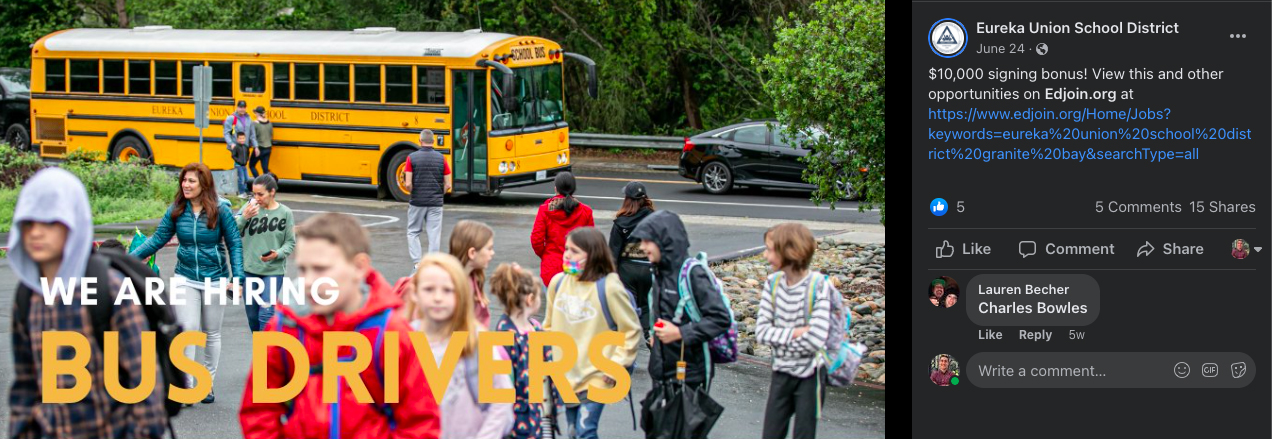Want To Become a Teacher? You Could Land a $25K Signing Bonus
Labor shortages continue to impact schools. As the academic year approaches, more districts are offering generous incentives to entice staff

Get stories like this delivered straight to your inbox. Sign up for The 74 Newsletter
As labor shortages continue to plague schools across the county, districts are offering thousands of dollars in signing bonuses to entice new teachers and staff before the upcoming year.
Hartford, Connecticut is offering a $5,000 signing incentive for educators in high-demand subjects like math, science and bilingual education. Taos, New Mexico promises a $50,000 starting salary for any new teacher hire, plus a $10,000 bonus. Stanly County Schools in North Carolina also announced a $10,000 signing incentive.
“We wanted to give teachers [an] … incentive to come to beautiful Taos,” Superintendent Lillian Torrez told The 74 via email. Funding provided by the federal government through the American Rescue Plan “has helped with this project,” she said.

In an extreme example, Gallup-McKinley County Schools in New Mexico is incentivizing teachers to join the district’s ranks by dangling bonuses ranging between $18,000 and 22,000, plus $2,500 to 4,500 for relocation — a grand sum that could top out around $25,000.
Bus drivers, too, are in short supply. Lower Merion, a school system outside Philadelphia, announced a $4,000 incentive for drivers to join the district’s ranks. California’s Eureka Union School District is offering $10,000.
“Hiring school bus drivers with BIG incentives!” one Eureka posting reads.

Burbio, a data service that has tracked school policy through the pandemic, said that while districts have been using incentives to attract workers for months, the dollar amounts recently have ballooned — perhaps reflecting a last-ditch effort to get fully staffed by the first day of school.
“In the past few weeks, we have noted a marked increase in the size and duration of these payments,” Burbio co-founder Dennis Roche wrote in the company’s Aug. 1 newsletter.
The generous bonuses are only the latest examples of the extreme lengths school systems are taking to handle what some experts are calling a staffing “crisis.”
In Texas, several rural districts are switching to four-day weeks due to lack of staff. In Florida, leaders are asking Army veterans with no teaching experience to serve in classrooms. In Arizona, some children may soon receive instruction from college students rather than certified teachers. And in Buffalo, New York, a driver shortage has prompted leaders to consider providing a 58.5 cent-per-mile reimbursement to parents who opt to drive their children rather than put them on the bus.
Throughout the pandemic, K-12 staff shortages have disproportionately affected impoverished districts. Yet even large school systems have felt the effects. In early August, Charlotte-Mecklenburg Public Schools in North Carolina announced they had 415 remaining teacher vacancies — more than six times the number of open positions this time last year.
Nationwide, there were roughly 300,000 openings for education jobs in June, according to the most recent numbers from the U.S. Bureau of Labor Statistics. Other data indicate the total could be even higher: A representative sample of the nation’s nearly 100,000 schools reported an average of three teacher vacancies and another three unfilled non-teaching positions such as for custodial staff, cafeteria workers or bus drivers in a June survey from the National Center for Education Statistics — hinting there could be close to 600,000 openings.
Vacancies, however, do not necessarily mean that campuses are short-staffed. Unfilled positions can also arise because schools added new roles, explained Chad Aldeman, policy director of Georgetown University’s Edunomics Lab.
“Districts are currently flush with cash thanks to the infusion of $190 billion in federal aid. As a result, many districts have ambitious hiring plans to add more teachers, mental health supports, instructional aides, or tutors,” he wrote in an email to The 74.
More than three-quarters of school systems have increased their total number of employees above pre-pandemic levels, including both teaching and non-teaching roles, a recent study from the Rand Corporation found.
“In short, we believe it is districts’ increase in number of staff that they seek to employ rather than an exodus from teaching that is straining the teacher labor market,” the authors wrote.
Meanwhile, the economy added an unexpectedly large number of new jobs, according to the just-released federal report, including a seasonally adjusted 27,000 in K-12 education in July. With unemployment rates down to just 3.5% nationwide and a continued decline in the share of Americans working or actively seeking work, there’s no indication the hiring landscape will ease anytime soon.
“Unemployment rates are low, meaning almost everyone who wants a job already has one,” said Aldeman. “All this competition may be hard on employers, but it’s good for the workers who are on the receiving end of these stipends and bonuses.”
“Districts are going to have to be aggressive and creative to find and keep employees in critical shortage areas,” he wrote on Twitter.
That’s been the name of the game for Supt. Torrez in Taos, New Mexico. On her district’s home page is a scrolling, full-screen slideshow of the benefits for new hires:
“WE’RE HIRING! Receive a $10,000 Additional Recruitment Incentive”
“LISTEN TO WHY TEACHERS LOVE TEACHING AT TAOS SCHOOLS! Click below for video and then click on the right arrow for the application!”
“WOULD YOU LIKE A $10,000 SIGN-ON RECRUITMENT INCENTIVE FOR A NEW JOB AS A TMS TEACHER? Click below for the application!”
She is not concerned with why the market is strained, but rather on how she can navigate those conditions and still ensure her district has a full teacher corps when her 2,100 students return to buildings Aug. 11. The $10,000 signing bonuses, she says, have enticed 10 candidates, but 7 open positions remain.
“We still have a few openings,” she said. “However, I would call [the incentives] a success, overall.”
Get stories like these delivered straight to your inbox. Sign up for The 74 Newsletter

;)
